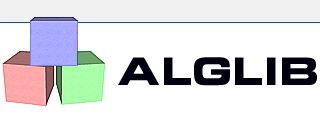
The symmetric matrix A could be represented as A=Q·T·QT, where Q is an orthogonal matrix, and T is a tridiagonal matrix. We can say that matrix A is reduced to a tridiagonal matrix via a similarity transformation. QT·A·Q = T.
Like other algorithms of orthogonal factorization (for example, QR and LQ decomposition algorithms), this algorithm uses a sequence of elementary reflections to transform the matrix A. The transformations are applied to the matrix both from the right and from the left, preserving the matrix symmetry on each stage and sequentially removing non-diagonal elements.
As a result of SMatrixTD subroutine, matrix A is replaced by the tridiagonal matrix T and a sequence of reflections transformations stored in a compact form. The format of the matrix and the subroutine parameters are described in detail in the subroutine comments; there we can note an analogy with QR-decomposition, that uses the lower triangular part of the matrix R to store the matrix Q and utilizes a very similar data storage format. As with QR decomposition, a subroutine for "unpacking" the matrix Q is presented: SMatrixTDUnpackQ.
This algorithm is transferred from the LAPACK library.
This article is licensed for personal use only.
ALGLIB Project offers you two editions of ALGLIB:
ALGLIB Free Edition:
+delivered for free
+offers full set of numerical functionality
+extensive algorithmic optimizations
-no multithreading
-non-commercial license
ALGLIB Commercial Edition:
+flexible pricing
+offers full set of numerical functionality
+extensive algorithmic optimizations
+high performance (SMP, SIMD)
+commercial license with support plan
Links to download sections for Free and Commercial editions can be found below:




